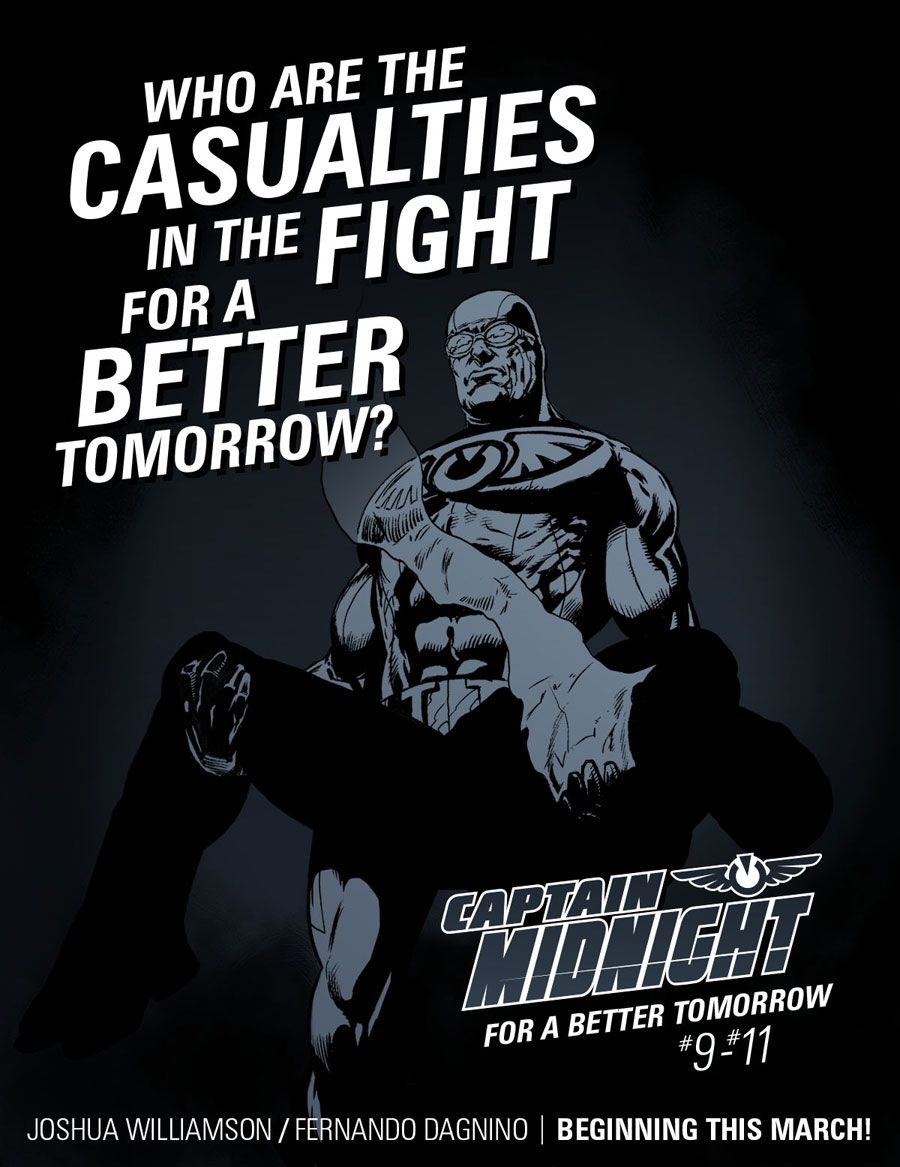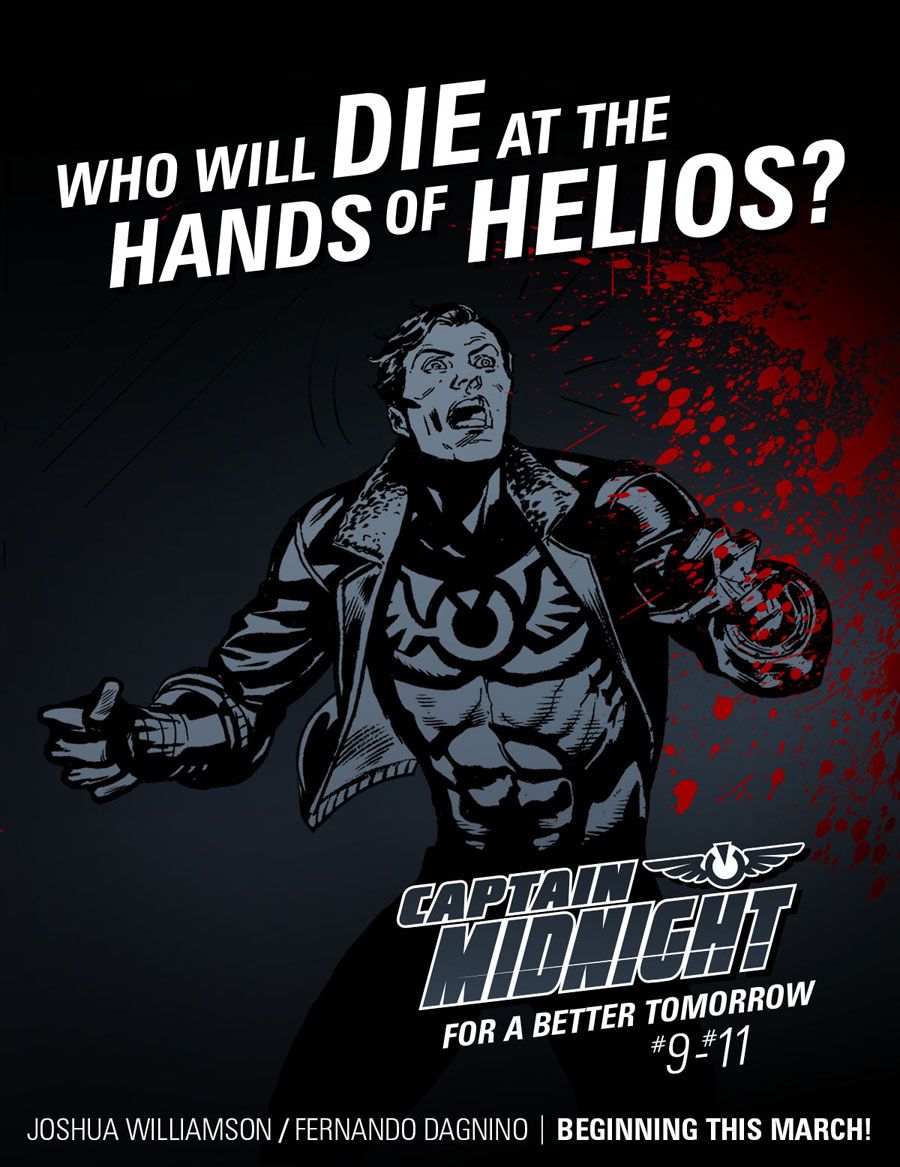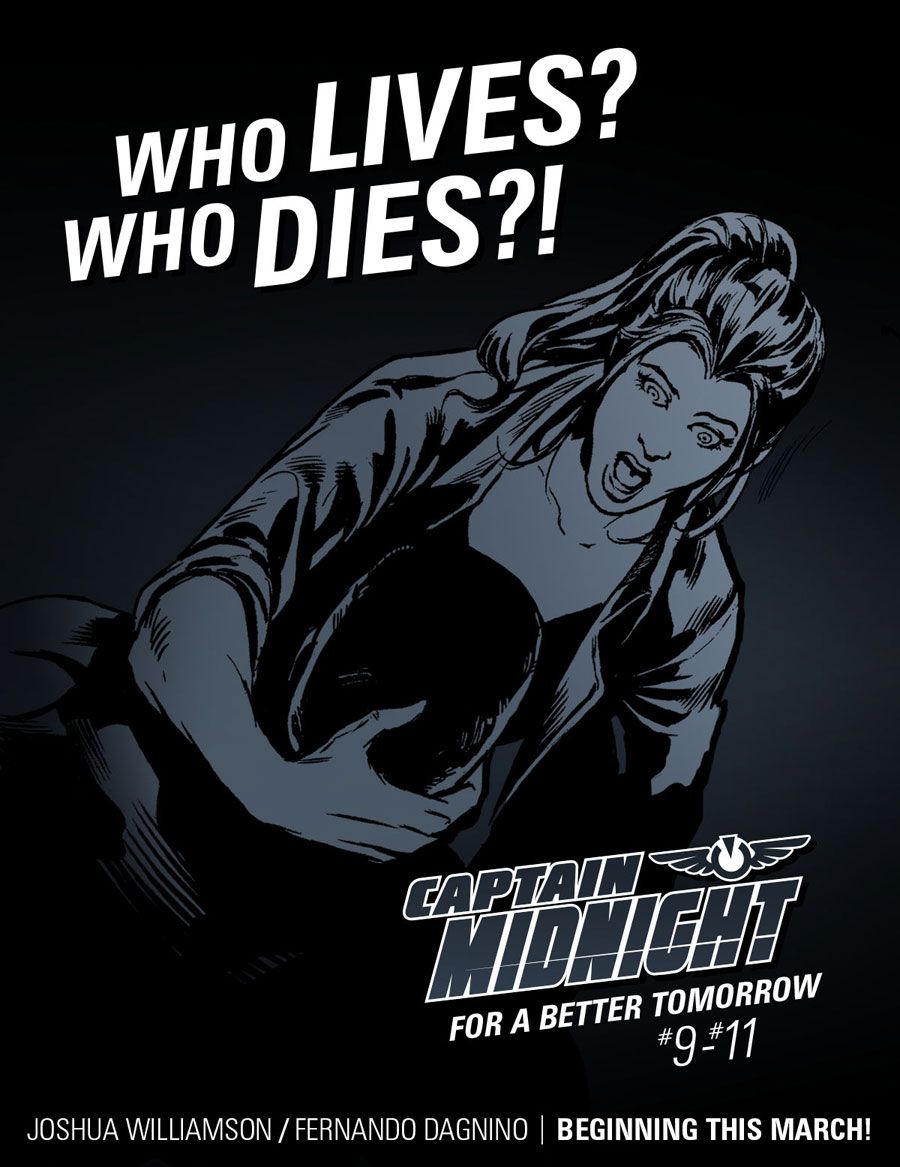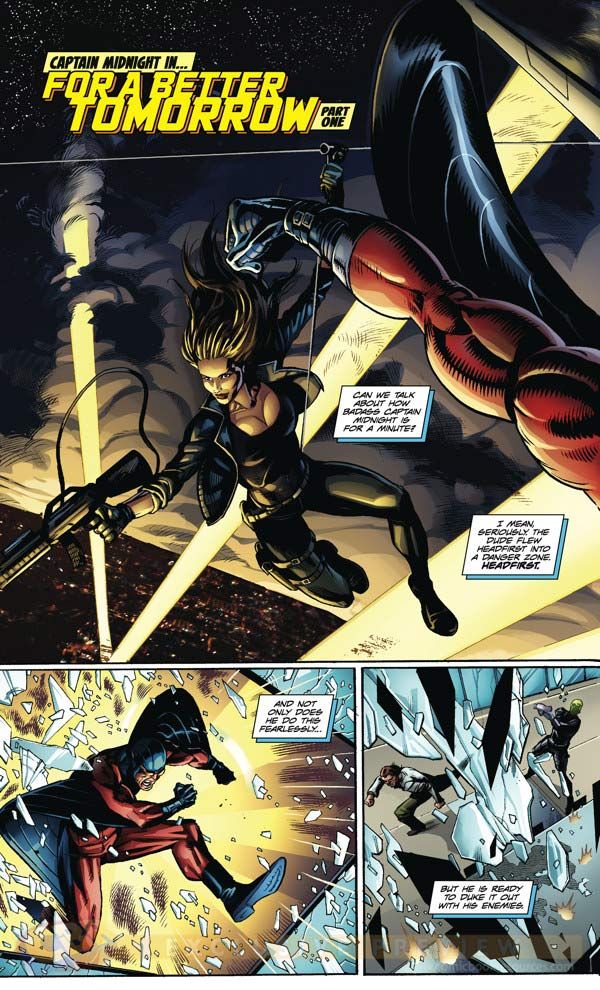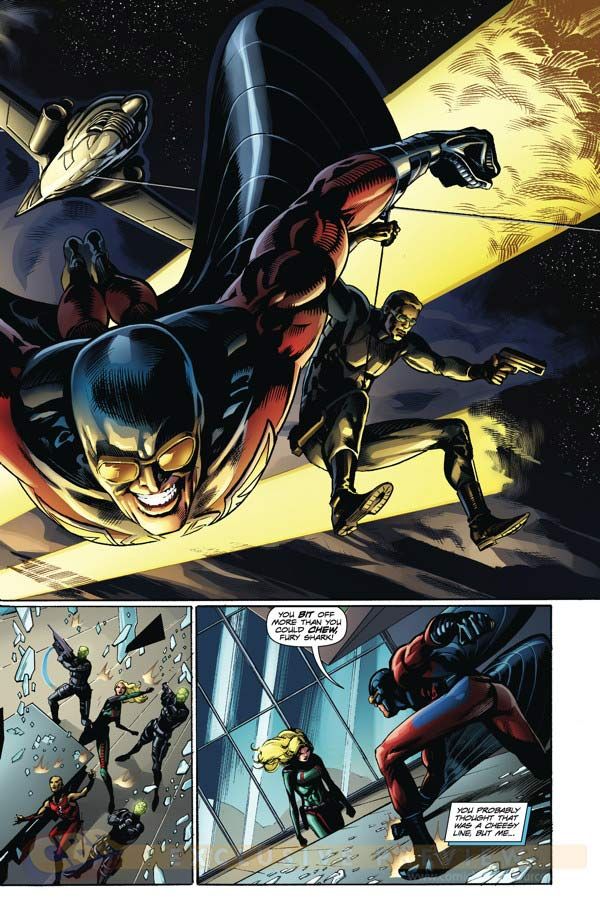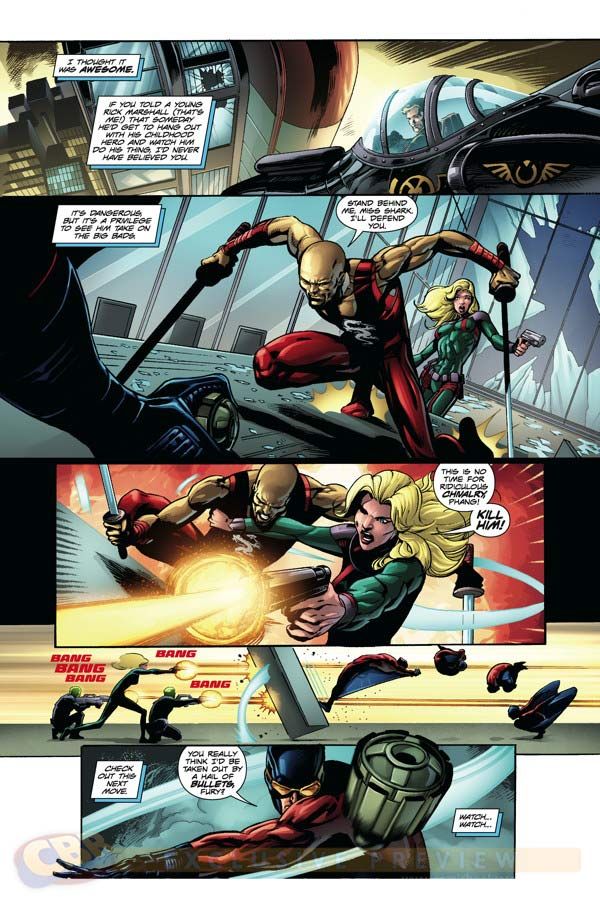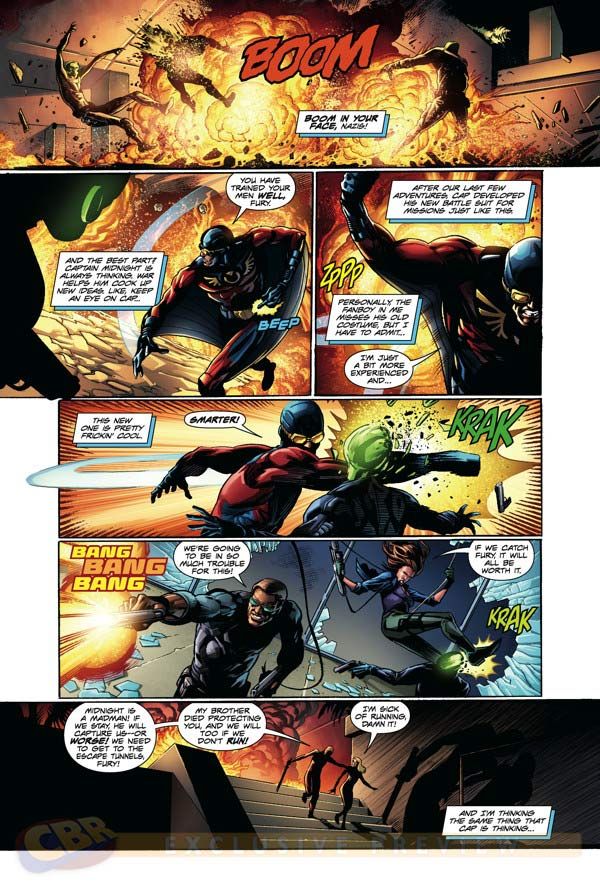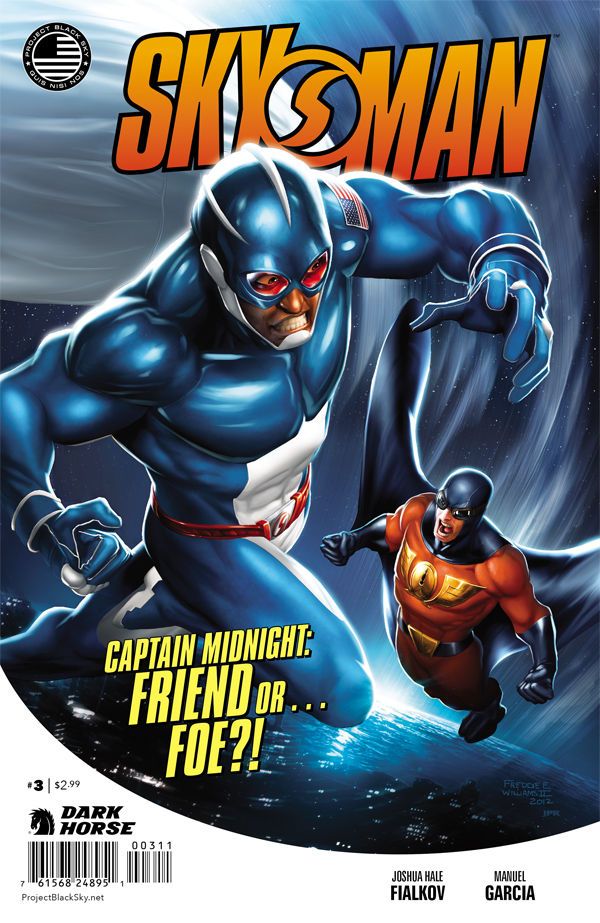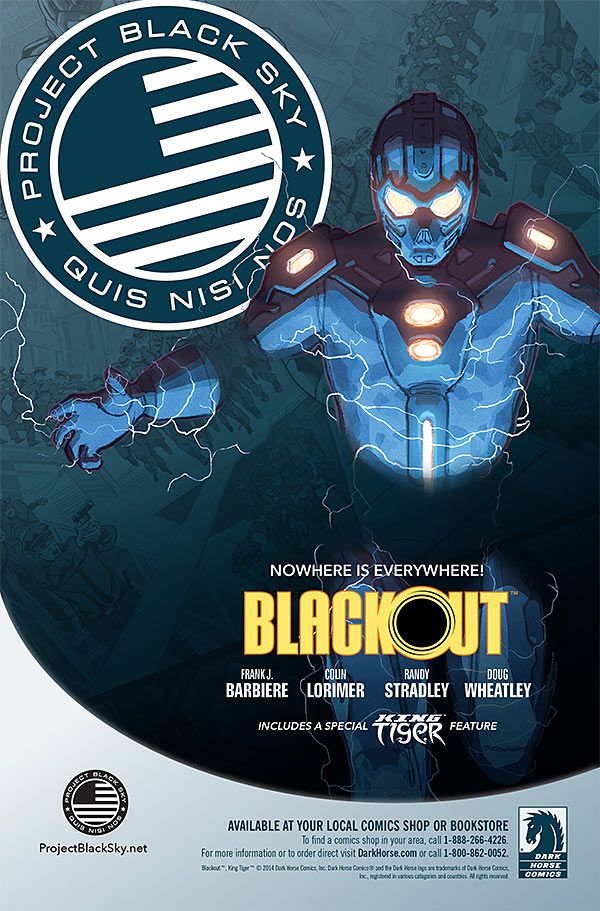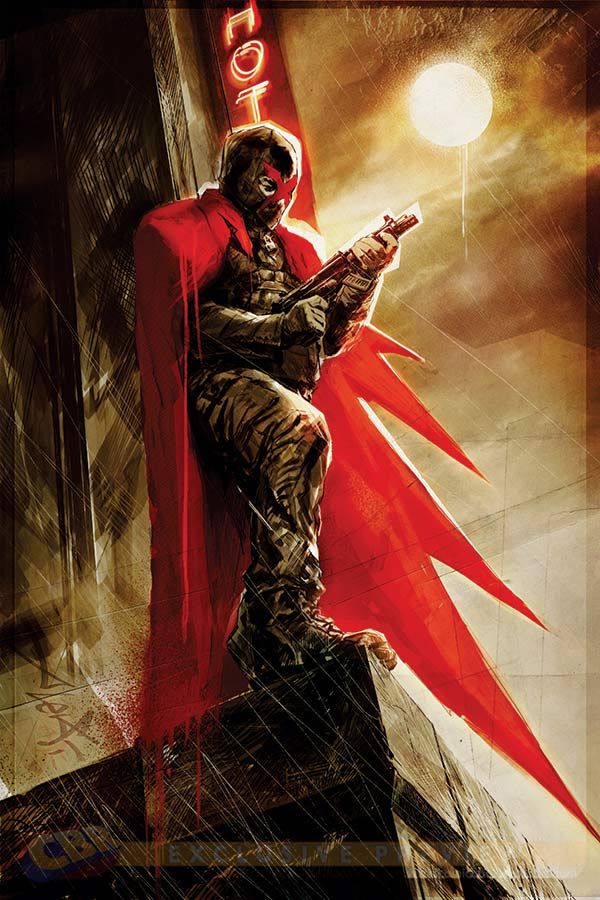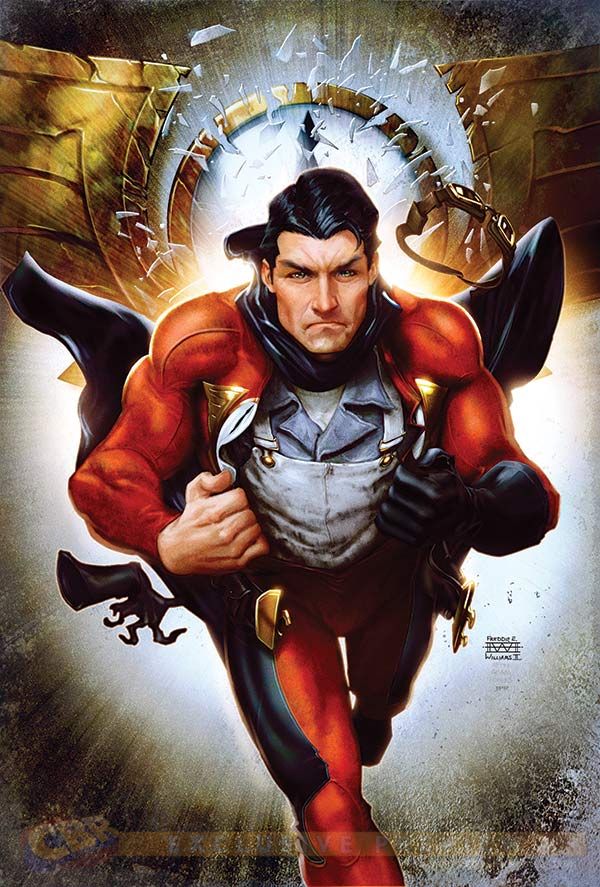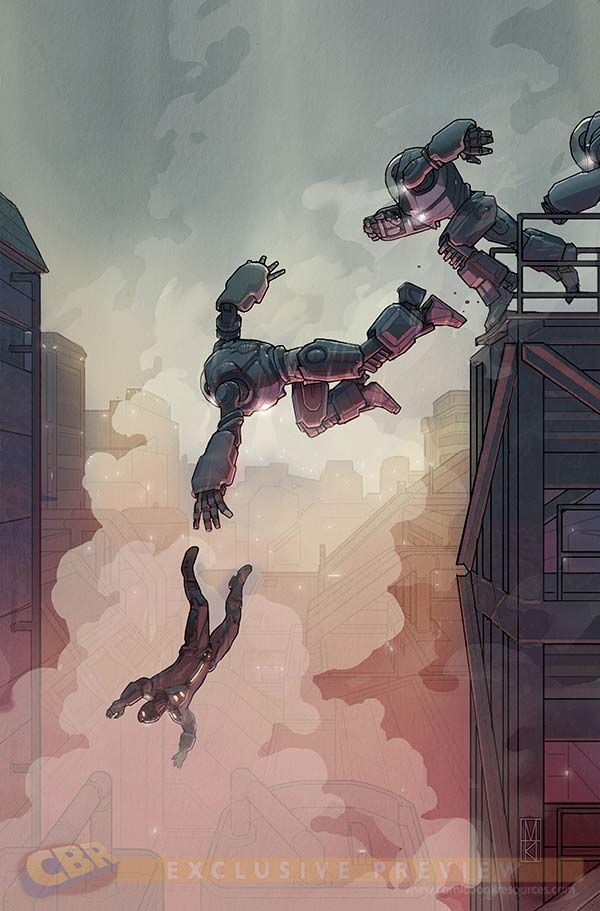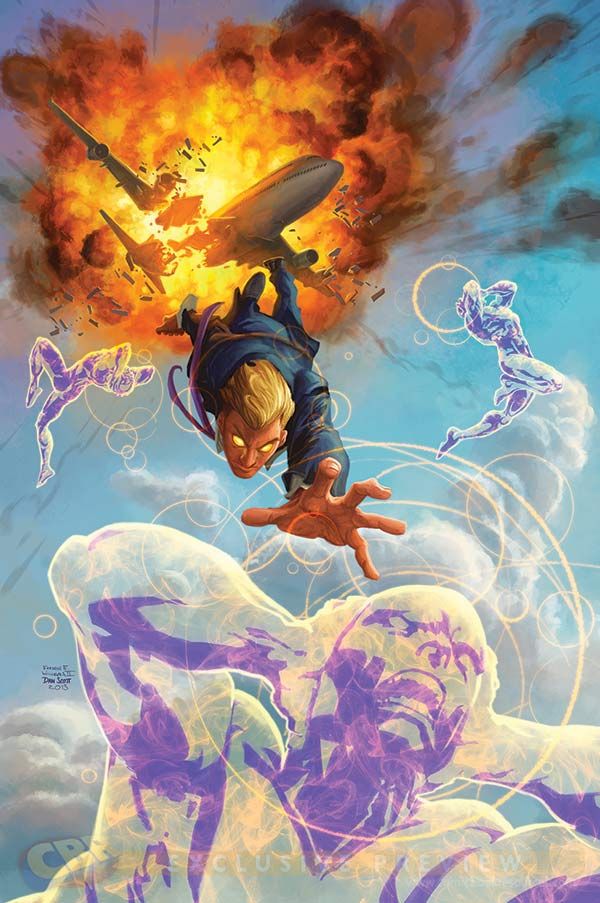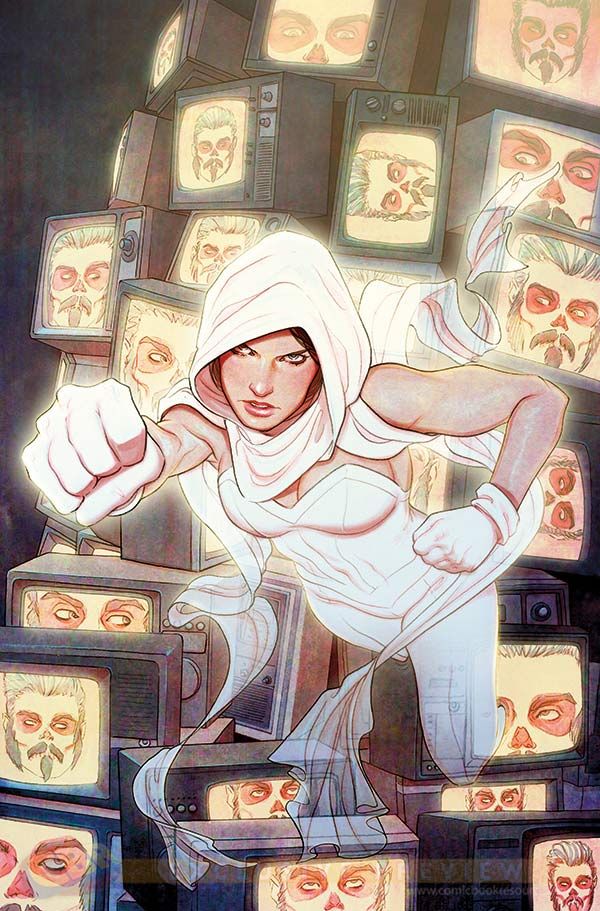This month marks the beginning of the next phase of Project Black Sky -- Dark Horse's growing line of superhero comics.
First up is March 19's "Skyman" #3 where the lead hero and his 1940s inspiration Captain Midnight team up for the first time. And on March 26, Captain Midnight's own series starts a critical arc full of revelations and deaths as "For A Better Tomorrow" kicks off in issue #9. All of it paves the way for Black Sky's next wave of releases including the "Project Black Sky" Free Comic Book Day special in May, a subsequent digital-first series and the next Brain Boy miniseries "The Men From G.E.S.T.A.L.T."
For the latest round of CBR's monthly WATCHING BLACK SKY column, we've invited the writers behind all the turning point stories to look at the past and future of Project Black Sky. Below, "Captain Midnight" writer Joshua Williamson, "Skyman's" Joshua Hale Fialkov and "Brain Boy" and FCBD writer Fred Van Lente team with Editor Jim Gibbons to unpack the secrets in the offing. The quartet share what you do and don't know about the history of Project Black Sky, which characters will meet and which may die in the weeks ahead, why "Who If Not Us?" is a rallying cry for the line on and off the page and what "For A Better Tomorrow" really means for the future.
Plus, CBR has an exclusive first look at the line's June solicitations and cover art!
CBR News: Gentlemen, we're far along enough in the books that fall under the "Project Black Sky" banner that we know a little bit about the concept of the Project itself. It started thanks to a UFO crash in the 1940s -- an event started a government agency who both assisted in Captain Midnight's early technology and then went rogue. But before we get into more story specifics, who can tell me the origins of the idea that a shadowy Project like this could be the thing that tied together Dark Horse's superhero universe?
Jim Gibbons: Maybe I should chime in here as the designated "guy at Dark Horse!" [Laughter]
I think initially, when we had meetings about the line -- long before any of these books were being written -- the idea was a superhero universe where 25 random people through 25 random circumstances came about superpowers and then became superheroes and then ended up meeting each other to combat supervillains who got their powers from 25 totally different random origins. Well, that seemed like a more antiquated kind of comics. In the Golden Age, you could say, "Here's a guy who got struck by lightning. Meanwhile, this other guy got struck by gamma radiation," but it doesn't really work for readers today.
The idea of having a few central threads that over the history of the Project Black Sky universe led to all kinds of offshoots became critical. There were one or two major seeds planted, and then the roots all go off in their own direction. That was our thinking, and when everything is eventually revealed, you'll be able to tie them back to a few central events. Things that initially felt random turn out to not be random at all.
But within the books themselves, I think there are some thematic connections too. I get a strong sense that the clash of government agencies and private industry has become centrally important for a lot of you, but I wondered what overarching ideas seem most important for each of your books?
Fred Van Lente: When it comes to world-building, which we do a lot in comics, the smart thing is to have a simple concept that can spiral off in infinite variations. Definitely, in "Brain Boy," I was given a couple of key points that Dark Horse wanted me to hit, but they've mostly allowed me to run with the insanity. As the story has moved along and more ideas begin to crop up, you'll always return to this concept, which is very simple. We'll be getting into it even more in the "Project Black Sky" digital series that will lead to Free Comic Book Day, and the way I'd put that concept at this point is to say that you can't necessarily assume that these are aliens that started this whole thing.
Joshua Hale Fialkov: Part of what attracted me to doing this was that all the things I've been doing at Marvel are these big, huge, global kinds of stories. It's heavy continuity and heavy world-building stuff. Part of what I liked about the pitch that Jim and Mike Richardson gave me for "Skyman" was that this was a guy who is sitting in the corner of it all. He's just starting to see the cover come off everything that's happening, so he's really in a similar place to the audience in terms of what he doesn't know. That allows it to be a story about a character. It doesn't have to be about big ideas, and it doesn't have to be about the mystery. It just has to be about him coping with what's happening around him. That's been really satisfying especially since by doing that, it's been revealing more and more of what's going on in the background.
I think all of these books do the thing that good superhero comics are supposed to do. That is, you can read any of them individually, but if you read them all together, you start to get a better, bigger picture of what's going on. That's something that is a bit of a lost art as events take over [at the Big Two] and coordinating how every book fits into an event becomes so central that eventually, nothing makes sense. With us, each book really does stand on its own, in a cool way.
Joshua Williamson: To go along with that, Captain Midnight is really looking at this whole world because he's new to it. Even though he's responsible for a lot of this world -- since we've revealed in "Captain Midnight" that his company, Albright Industries was approached by Project Black Sky in the '40s to develop this technology -- when he disappeared, all that work of his became corrupted. By the government. By his own company. By Fury Shark. Now, Cap's walking back into this strange new world, and the cool thing about the universe is that I can show it all through his eyes. It's this big world, but I can drop in those ideas through hints as I tell Cap's story. Like Josh just said, that's kind of a lost art. One of the things we've maybe lost in comics is patience. Yes, we've got a number of books here all telling a cool story by themselves, but if you're paying attention and you're patient, there are clues there. There are things being slowly revealed and put together. If you have that patience, it'll pay off in a big way with all the Black Sky stuff. That's one of the most fun parts of doing this -- just dropping those little hints. Sometimes I think no one will ever notice what we're doing, but then, when people do, I'm happy on both sides.
One of seemingly key elements that has been getting broadcast via mailing and Twitter and blogging on the Project Black Sky front has been the organization's Latin motto, "Quis Nisi Nos," which translates to, "Who If Not Us?" What thematic significance does that have for these books outside of the plot elements it draws to mind?
Fialkov: It works nicely on a couple of different levels. At the end of each book with each character, that's a thematic through line which I don't know that we set out to do initially. Skyman has shown that there's bad shit going on in the world, and he's empowered to do something about it. The idea of him being passive and not taking an active hand in this is his true challenge. He has every reason in the world to just play along, and yet he sees that he has to step forward.
On the other side of it, just talking to Jim and Mike and everyone at Dark Horse, it feels like this entire line of superhero comics is that their goal is to do fun, approachable superhero comics in the classic mold because nobody is doing it. That's not meant as a putdown to anyone else. I think Marvel does some crazy cool stuff, and things are super progressive there in terms of redefining the boundaries of what superhero comics can be. But I think Dark Horse has made a commitment to showing that there's a way for the roots -- for the core structure and shape of superhero comics -- to continue to exist. And they can still be modern and fresh and different. That's something we've all been striving towards.
Williamson: With Captain Midnight, he feels responsible for what's going on in this world. So for him "Who if not us?" feels like there's really no option there. He has to do what he's doing. He's not responsible for everything that's happened in this world since he disappeared, but he was the first person to tip the domino over. And for now, he's only seen the surface of what that means, but he needs to take care of it still.
And then, also, what Josh said. [Laughter]
Gibbons: What I like about the "Who if not us?" phrase and how it nicely applies to the line is that as soon as you start asking yourself who's posing that question -- regardless of who it is -- it shows that the person asking is convinced that they have a responsibility to their end motivation. Whether you apply that to the heroes or the conspiracy-based organizations, what you see is that everyone thinks they're out doing the right thing. They all have their own agendas and think that they're the only ones who can do what's right. As we get into the digital series, Fred will begin to show us more about how that phrase applies to the mysterious Project Black Sky.
Van Lente: In almost nauseating detail! [Laughter]
On the "classic superhero" front, we're starting to get more into crossovers between the books. I know Brain Boy showed up briefly in "Captain Midnight," though the two never met directly, and there was the "2 Past Midnight" series. But with "Skyman" #3 we're seeing Captain Midnight cross into another book in a more confrontational way, and a big part of the "Project Black Sky" Free Comic Book Day story is about Midnight and Brain Boy butting heads. How is that stuff coming together, collaboratively?
Fialkov: Part of this is about the fact that the new Skyman, Eric, needs an example, to some degree. He's still kind of running wild at this point. He's trying to get away from the people who are manipulating him, and there's no better person to turn to in that situation than Captain Midnight. Getting a chance to put those two characters together, and not do that whole thing you're going to expect, where they have to fight first and then team up, is great. They recognize in each other a heroism and a brotherhood that lets us jump right past that stuff and get right into the character work and the trust and, most importantly, the plan building.
Captain Midnight in Williamson's book is already aware of how corrupted his technology has been, and this new Skyman represents the other side of that. He sees that the technology that's been built from his ideas can be used for good. It really does come down to who's wearing the mask and not just the mask that's being worn. That's a pretty grounded thing. It doesn't feel forced, and there's a natural arc for the story. It lets both characters be heroes together, and there's a ton of flying around and fighting an army of flying dudes. What could be better? There's nothing.
Wait. Giant robots might have been better! Jim, can we change that to a giant robot battle?
Gibbons: Yeah, I'll just go get those issues redrawn. [Laughter]
Fred, has the fact that all the characters you're playing with in both the "Project Black Sky" digital series and the new "Brain Boy: The Men From G.E.S.T.A.L.T." miniseries will clash on Free Comic Book Day impacted how you're writing all of this?
Van Lente: It's a bit of a juggling act, but it's a lot of fun. The online series, "Brain Boy 2" and the one-shot are all kind of separate entities. Just like Josh was saying earlier, you can read them all individually, but they do form the same overall tapestry. I just finished the script for the last issue of "G.E.S.T.A.L.T." and I had to resist the temptation to make the ending literally be a setup for "Project Black Sky." But I was able to end it on a note relevant to Brain Boy's corner of the universe, and it ended up being more satisfying for those just reading Brain Boy's stories. I like the idea of everything being distinct but essential.
Gibbons: And like Fialkov was saying earlier about each book being its own entity, "Brain Boy" really becomes this spring-launching series in the midst of this other stuff. It takes some steps towards a larger world stage, but it's still very contained. It's a trend a lot of the Project Black Sky books are going to start to follow; the things you've seen so far in "Captain Midnight" or "Ghost" or "X" are very contained in their own book, but the new "Brain Boy" mini starts to let these plotlines bleed out into the bigger world and be a bit more public. Things are showcased at a level where the different characters have to become more aware of what's going on, by necessity. Due to that, the natural progression of storylines will have these characters coming together more often as well.
Van Lente: Partly what's exciting about the second phase of this is, while the readers may be aware that there are connections between these books, only now are the heroes learning that. That'll play out with the books crossing over and in the "Project Black Sky" series.
While guys like Captain Midnight and Skyman seem to be somewhat optimistic about the world in how they take on these roles, Brain Boy is very much the cynic of the line. Is this miniseries working to test that conception some?
Van Lente: A lot of Brain Boy's personality flaws can be summed up by the fact that he's not technically a boy but is still just a young guy trying to figure it all out. He has a lot of views that will be tempered with age and time and getting his ass handed to him by the world. So this is definitely a story of someone maturing. That's what learning to be a hero is all about. But he will still be kind of a dick under it all. [Laughs]
Josh, on the "Captain Midnight" front, you're about to get into the "For A Better Tomorrow." That not only serves as a capper on the first year of the book, but it's also is promising some big changes, including the death of at least one character. How did you want to wrap certain big ideas up in this story?
Williamson: From the very beginning, we had a strong idea of what we wanted to do with this story; it was very important that we established a big mystery, but we didn't want to drag it out. We knew that there were a certain number of questions that needed to be answered by the end of year one. At the same time, when I've been writing "Captain Midnight," one of the things I realized is the fact that he can be very passive at times. He's gone after people while investigating Project Black Sky or Skyman, but he still knew that his greatest enemy, Fury Shark, was out there, and that his best friend from World War II, Chuck, had been missing this whole time. He knew these were issues, but he took no action about them.
"For A Better Tomorrow" is the arc where he realizes he has to do something. He goes after Fury and tries to get answers -- and it goes bad. Not everyone makes it out alive. It's hard on him, but it will change the book a bit. This story starts to push the book in a new direction and will do something kind of crazy with it once we've answered the questions from across year one.
It's been fun, because we've got this character of Helios who we've been building up since the first arc, and we've been able to take our time building this thing. In "For A Better Tomorrow," we see how Cap had this idea dating back to the '40s, where he wanted to build a better future. Now, he comes back and feels that's been taken from him. His future was stolen in the form of people like Helios. Cap looks around and wants it back, but he realizes that his vision of a perfect future is not going to be the same as everyone else's. There are people out there in the world -- good guys, bad guys, Project Black Sky -- who have a very different view of what the future should be. In World War II, it was very black and white. That's a harsh thing for Cap to learn going into this story, and figuring that out comes at a cost.
One thing that's stood out to me just reading the preview pages of "For A Better Tomorrow" part 1 is that Rick Marshall -- Cap's #1 fan and aide -- is narrating this series for the first time. I've gotten the impression for a while that he knows more than he's letting on. How have you been working through him, or in general, to kind of pull the rug out from under readers in terms of their expectations for how this story should wrap?
Williamson: We talk about this in #9 a little bit, because when Cap returned, Rick started rebuilding his life a little bit. He's taken the place of Cap's missing friend Chuck in some ways, and he doesn't even realize he's taking the place of the surrogate best friend [Cap] lost. Overall, this story leads to a big reveal that we almost put earlier in the book, but we thought it'd mean more if we held it until this story. One thing I've realized writing this book is that when you get close to a project, sometimes things that means one thing to you will mean something completely different to your reader. We know the big plan here, and we know what's going to happen. So when a big reveal comes around, we don't have to wrap our heads around it in the same way. We've been talking about the death, because it's something cool to talk about for people, but it's really not the most exciting part of this story for me. The most exciting part is the character stuff -- what happens between the cast and the big moments that happen which are almost more heartbreaking than a death. We've been building towards all this from the very beginning -- all the way back to the "Dark Horse Presents" stories -- and it'll pay off in #9, 10 and 11.
Gibbons: Going back to "Dark Horse Presents," one of the really cool things about Captain Midnight has been the sense that we told a little bit of the story that took place in the '40s, and then the main part of the narrative started up today. But for a lot of these titles, there's this large gap that Josh got to fill in a little bit with "Captain Midnight" #8 which gave some info on Project Black Sky. Meanwhile, Fred laid out some of the background in his initial "Brain Boy" stories in "Dark Horse Presents." There's even more of that coming up in the "Project Black Sky" digital series and the Free Comic Book Day issue, but these large spans of time remain relatively unfilled, and through Captain Midnight you'll see how one man works to put those pieces back together.
As we go, you'll see the evolution of how this whole world was put together. Midnight was there at the beginning of Black Sky as an organization, and now he's returned to find this huge thing. It's 70 years of evolution for this organization alongside his own company. That's a ton of layers of mystery that we can peel back across all the titles, which is very fun. A lot of that comes to a fruition in "For A Better Tomorrow."
Williamson: We definitely answer a lot of questions and we presents some new ones too. There's a shadow war going on between some of these organizations, and you'll start to see the major pieces of that. In fact, one of the biggest pieces of all of this is laid out in front of the reader, here.
Overall, with all the plates you've got spinning, what's the piece of Project Black Sky you could name that will serve as the spark for year two of all these stories?
Van Lente: I think part of that is the countdown clock that has been featured at different places online. That's definitely counting down to something big.
Williamson: And that Free Comic Book Day issue is crucial to all of this.
Gibbons: A lot of these books and stories have gotten to a certain point now, where the pieces were being put on the board. In March, April, May and June, the sides have been shown and the battlelines have been drawn. The Free Comic Book Day issue is where the dominos begin to fall.
Project Black Sky Solicitations for June 2014
X #14
Duane Swierczynski (W), Robert Atkins (A), Michelle Madsen (C), and Aleksi Briclot (Cover)
On sale June 11
FC, 32 pages
$2.99
Ongoing
A merciless and unstoppable army calling themselves "the Chosen" have invaded Arcadia, starting a full-fledged war with Carmine Tango's forces. They're looking for something . . . or someone. X has recovered from Tango's torment and is ready to pound some answers out of both parties!
• A game-changing new villain-a new chapter in the Project Black Sky event!
Captain Midnight . . . no more?!
Captain Midnight #12
Joshua Williamson (W), Manuel Garcia (P), Bit (I), Marta MartÃnez (C), and Freddie Williams II and Jeremy Roberts (Cover)
On sale June 25
FC, 32 pages
$2.99
Ongoing
Reeling from the death of one friend and the betrayal of another, Captain Midnight throws himself into his work to mourn. Disillusioned with why he wears a costume, the time-traveling hero ponders what the world needs more of: the brawn of Captain Midnight or the brains of his civilian identity, genius inventor Jim Albright?
• The start of a brand-new arc!
• Written by Joshua Williamson (Ghosted, Masks and Mobsters)!
Blackout #4 (of 4)
Frank J. Barbiere (W), Randy Stradley (W), Colin Lorimer (A/C), Doug Wheatley (A), Rain Beredo (C), and Micah Kaneshiro (Cover)
On sale June 25
FC, 32 pages
$2.99
Miniseries
The dimension-jumping Blackout suit is a powerful weapon-except when it doesn't work! And if you're Scott Travers and don't know how the suit functions and are facing off against enemies wearing ultrapowerful combat armor, the Blackout suit is just extra weight-dead weight!
• Story by Frank J. Barbiere (The White Suits, Five Ghosts).
• Special King Tiger feature by Star Wars stars Randy Stradley and Doug Wheatley!
Fred Van Lente and Freddie Williams II!
Brain Boy: The Men from G.E.S.T.A.L.T. #2 (of 4)
Fred Van Lente (W), Freddie Williams II (A/Cover), Jeremy Colwell (C), and Dan Scott (Cover)
On sale June 18
FC, 32 pages
$2.99
Miniseries
Agent Price's flight to the desert to confront a psychic doomsday-cult leader gives new meaning to the word turbulence as he fights tooth and brain for his psychic soul thirty thousand feet up in the air. Is there a shadowy agency out to ground the United States Secret Service's best agent?
"It will make your brain happy."-Bloody Disgusting
"Five out of five."-Unleash the Fanboy
Jan Duursema joins the team!
Ghost #5
Chris Sebela (W), Jan Duursema (P), Dan Parsons (I), Dan Jackson (C), and Jenny Frison (Cover)
On sale June 4
FC, 32 pages
$2.99
Ongoing
When Tommy starts to suspect that Von Ghastly, the eccentric host of a bloodcurdling cable access show, may be up to more than just morbid mischief, Ghost leaps into action . . . but she has an audience of her own! Chris Sebela serves up big screams on the small screen!
• Beginning a new arc!
"Loaded with mystery and drama, set against a fantastically large supernatural backdrop."-Comic Vine
"A strong, smart offering from Dark Horse."-Comic Book Resources


